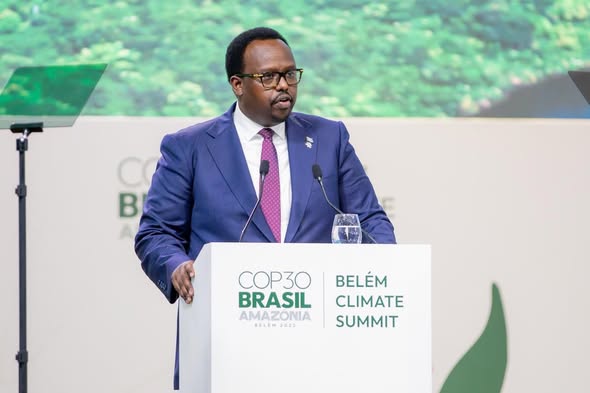Somalia’s Deputy Prime Minister Calls for Stronger Global Climate Cooperation at COP30 in Brazil

The Deputy Prime Minister of the Federal Government of Somalia, H.E. Salah Ahmed Jama, has called for urgent, coordinated global action to tackle the growing threats of climate change during his address at the 30th United Nations Climate Change Conference (COP30) held in Belem, Brazil.
The high-level conference, attended by world leaders, environmental experts, and international organizations, focused on strengthening commitments to limit global warming and support climate-vulnerable nations.
In his speech, Deputy Prime Minister Salah Ahmed Jama emphasized that Somalia is one of the countries most affected by the impacts of climate change, despite contributing almost nothing to global greenhouse gas emissions.
He noted that Somalia continues to face recurring droughts, flash floods, desertification, and erratic rainfall patterns that have caused widespread displacement, food insecurity, and economic instability.
“The people of Somalia are on the frontlines of a climate crisis they did not cause,” said Deputy Prime Minister Jama. “Our communities are losing livelihoods, our environment is degrading, and our future generations are being placed at risk. This is a collective problem that requires a collective global response.”
He stressed that climate justice must be a central pillar of international cooperation, urging developed nations to honor their financial and technological commitments to vulnerable countries. He highlighted that Somalia’s challenges cannot be solved without global solidarity and meaningful climate financing that supports adaptation and resilience-building at the local level.
During his address, the Deputy Prime Minister presented Somalia’s Nationally Determined Contribution (NDC) and Climate Adaptation Plan, both part of the country’s National Transformation Plan (NTP 2025–2029). The plan focuses on four key pillars: adaptation and resilience, climate financing, addressing loss and damage, and advancing clean and renewable energy transition.
He noted that Somalia is already taking steps to integrate climate action into its national development priorities, including reforestation programs, renewable energy investments, and policies that promote sustainable land and water management. He said the government aims to empower local communities to play an active role in protecting ecosystems and adapting to changing environmental conditions.
Deputy Prime Minister Jama called on the international community to strengthen cooperation in climate mitigation, adaptation, and technology transfer, underscoring that no country can face the climate crisis alone.
He concluded by reaffirming Somalia’s commitment to working with global partners to build a resilient future. “We must act now — not tomorrow — to safeguard our planet, protect our people, and ensure that the next generation inherits a livable world,” he said.
The COP30 summit, hosted in Belem, marks another milestone in the global effort to advance climate goals under the Paris Agreement. It provides a critical platform for countries like Somalia to voice their challenges, share their progress, and advocate for equitable climate solutions.
